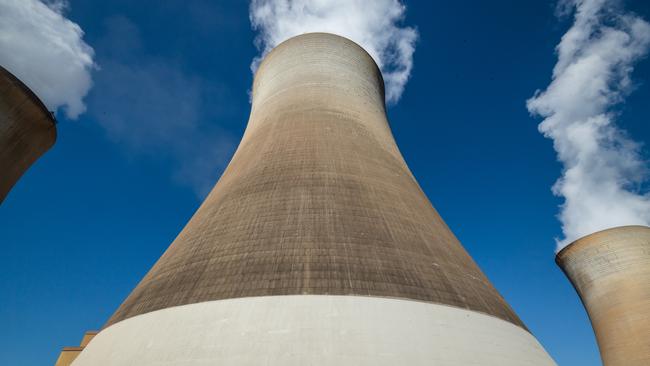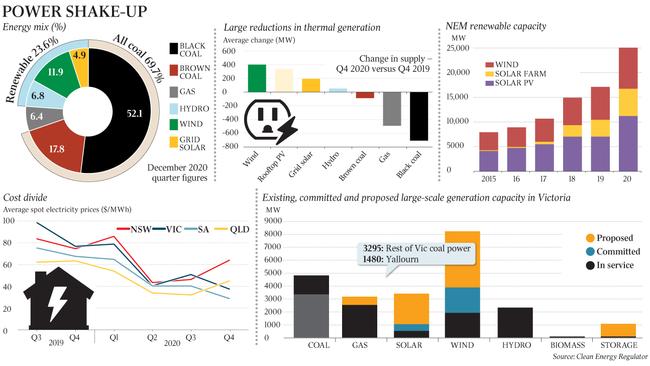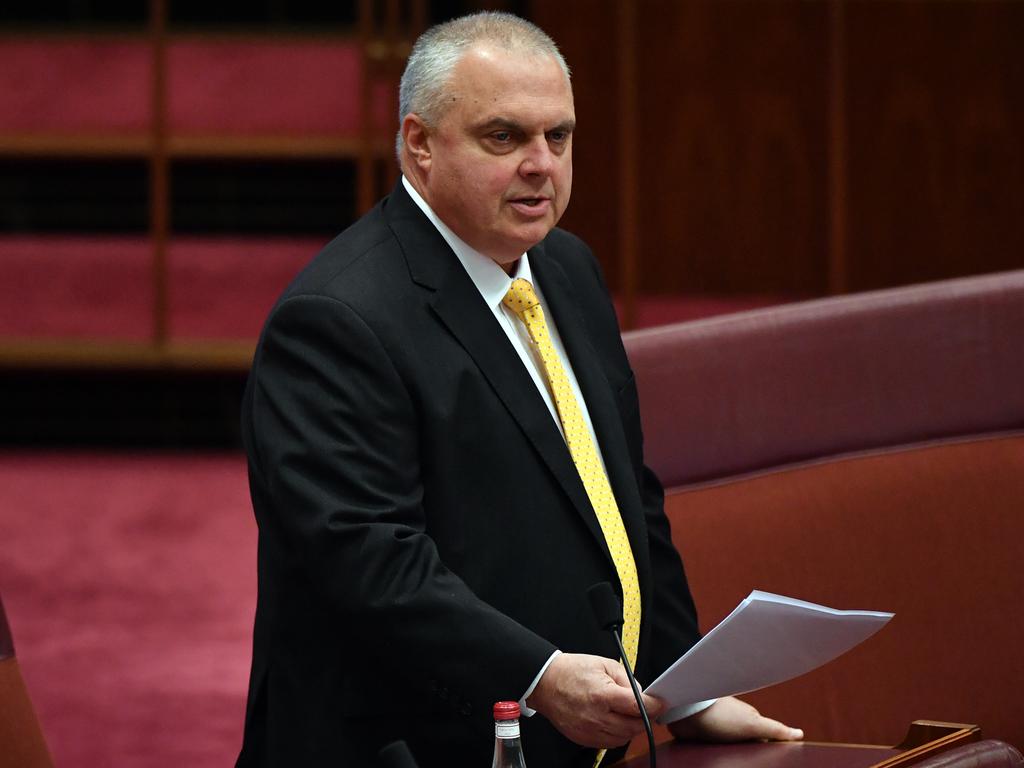‘Higher bills, blackouts’ from coal closure
Energy Minister Angus Taylor has warned the early closure of the Yallourn coal-fired power station in Victoria could lead to higher electricity bills and more blackouts.

Energy Minister Angus Taylor has warned the early closure of the Yallourn coal-fired power station in Victoria could lead to higher electricity bills and more blackouts, and demanded energy companies build new dispatchable generators in time for the plant’s shutdown in 2028.
Mr Taylor left the door open to the government stepping in and building a new generator, such as a gas-fired power plant, if the private sector did not fill the void, after EnergyAustralia announced it would close Yallourn four years earlier than expected.
The 1480-megawatt plant in the Latrobe Valley supplies up to 22 per cent of Victoria’s electricity and 8 per cent of the national market. “We need to see industry making investments to replace power stations that leave the market,” Mr Taylor said.
The decision, driven by low wholesale power prices caused by rapid growth in renewables generation such as wind and solar, will leave a gap in generation capacity of more than 1000MW and comes on top of AGL’s decision to close the Liddell power station in NSW in 2022-23.
It inflamed tensions between the federal government and the Victorian government which has encouraged the entry of renewables but has been forced to underpin the operation of Yallourn for the next seven years to allow the industry time to replace its generating capacity.
Mr Taylor said Victoria’s ambitious renewable energy policies, which include a 50 per cent renewables target by 2030, had driven the early closure, while Labor blamed the federal government’s “inaction on energy policy” for exposing the energy sector to a lack of certainty.
The move will cut the nation’s carbon dioxide emissions but industry groups warned renewables would continue to undermine existing power plants and a failure to manage the changes would damage national competitiveness.
Mr Taylor said the government would model the impact of the closure “to hold industry to account on the dispatchable capacity needed to ensure affordable, reliable power for consumers”.

“There’s always an incentive for industry to see less affordability; I understand that profitability is an obvious motive at times,” he said. “We want to see, though, that customers are properly looked after, and we get the affordability and reliability all Australians … and the people of Victoria deserve.”
EnergyAustralia will contribute to a Victorian government-led $10m support package for 500 workers at the plant. The company will build a 350MW battery as a partial replacement to the coal-fired power station which could provide power for up to four hours at a time.
EnergyAustralia chief executive Catherine Tanna said the coal sector was under strain because of the rapid growth of renewables.
“I think it’s fair to say it’s happened faster than most people forecast,” Ms Tanna said..
“It’s no secret that the future of all coal-fired power stations has been questioned a lot and what this announcement does is give clarity to the workforce at Yallourn around what the plan is and ensures the storage capacity comes in well before Yallourn retires. It gives everybody an opportunity to plan for whatever else might be needed for the market.” The closure in 2017 of Hazelwood, Victoria’s last coal plant to shut down, caused chaos in the national electricity market after owner Engie mothballed the facility with just four months’ notice.

Victorian Energy Minister Lily D’Ambrosio said the closure of Yallourn was part of a trend of “old, coal-fired power stations creaking to a stop around the world”. “We can’t ignore that change or pretend it’s not happening — and we owe it to these workers to build a modern energy network that creates and supports thousands of Victorian jobs,” she said. “The 2028 closure date announced today by EnergyAustralia gives us time to do that — and it gives us time to manage this transition properly for workers, including contractors and casuals.
“We will make sure this workforce is at the heart of our long-term response to today’s announcement, and we will deliver a dedicated support package.”
Australian Industry Group chief executive Innes Willox welcomed the seven-year notice for the closure, saying “nobody wants to see a repeat of the Hazelwood experience”.
“Ever-cheaper renewables will keep undermining the economics of existing power plants,” he said.
“The challenges of managing a highly renewable grid are real. If we solve them well, a new energy advantage beckons. If we don’t, we will lose competitiveness and block our pathway to net-zero emissions.”
Business Council of Australia chief executive Jennifer Westacott said more work needed to be done by industry and government to ensure there was an “orderly transition … We support EnergyAustralia’s decision to provide seven years’ notice to the community and the market as well as announcing a comprehensive transition package to help the local community.”
Grattan Institute chief executive Tony Wood said growth in renewables needed to be balanced with dispatchable power sources, which could include batteries, gas and hydro. There was also likely to be more interstate transmission as the network was upgraded, he said. “More solar at night-time doesn’t produce more electricity at night-time,” Mr Wood said.
He warned that the transition away from existing coal-fired power stations would increase energy prices.
“Whatever we do to replace old, coal-fired power stations is going to cost more,” he said.
“Even though solar and wind can produce electricity when they run more cheaply than you can produce from coal when it runs, the problem is wind and solar don’t run all the time and coal mostly does. We are going to see some cost increases, and that will flow through to prices.”
Federal opposition energy spokesman Chris Bowen said the workers at Yallourn “deserve a federal government with a credible plan for the jobs of the future”.
“Today’s announcement is another reminder domestic and global markets are decarbonising, whether Scott Morrison accepts it or not,” Mr Bowen said. “The Coalition government’s division and inaction on energy policy are leaving Australians exposed to these market forces.”
Greens leader Adam Bandt said coal had “had its day” but “Morrison’s coal-spruiking arrogance” left workers and communities at the mercy of big corporations and billionaires in overseas boardrooms.







To join the conversation, please log in. Don't have an account? Register
Join the conversation, you are commenting as Logout